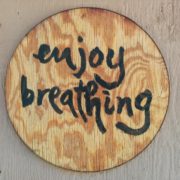Can meditation support your immune system, especially in light of the effects of COVID-19?
As someone that suffered with anxiety for most of my life, I am personally so grateful for my yoga practice, which includes various contemplative practices such as meditation. (Click here for a great image that reflects the many different types of contemplative practices.) What I found through the ongoing use of these tools is a consistent way to navigate stress to maintain my body, mind, and soul health. Stress is still present – and I no longer have any expectations of living a stress-free life – yet it no longer accumulates into an expression of anxiety.
Meditation is a very personal experience. It is the personal nature of the practice that can make it difficult to try and especially hard to maintain. There are also many different forms of meditation, so it definitely is not one-size-fits-all. Yet the intention behind meditation – to slow down the mind and help us detach from our thoughts – creates space. It is this space that can be scary. When we encounter stress, one of the most common tools humans go to in order to deal with the freeze/fight/flight response is distraction. We might distract ourselves by watching shows, eating, drinking, shopping, or one of the many other forms of impulsive behaviors that bring feelings of guilt and remorse along with them.
And yet more and more research is demonstrating the benefits of meditation, including how it can support our immune system functioning, which is vital right now in light of the pandemic. Meditation, whatever form of it that works best for you, helps to regulate the normal, natural human stress response, reducing the inevitable inflammation effects of that response. If we can find a form of meditation that we enjoy, then this tool can become the sharpest one in our toolkit and the one we consistently turn to when we feel anxiety building.
One of the more creative methods of meditations I utilize is journaling. This expressive writing tool has also been shown to reduce anxiety and depression. Relax Like A Boss, a website dedicated to wellbeing and stress, put together an ultimate guide to meditation journals. If you might consider this form of meditation, you can link to the guide here for tips on how to get started.
Contemplative practices do not have to be done for long periods of time, unless that works for you. Another one of my favorites is conscious deep breathing, and I do this several times a day for just a few minutes. It acts like a reset button for my nervous system. You might count how long you inhale and how long you exhale or you can include visualizations, such as colored light. You might add affirmations, such as inhaling peace and exhaling stress, if that helps give the thoughts in the mind the necessary mini vacation. Simply keep in mind that you cannot do it wrong!
I think what is most exciting is how research is looking at the body-mind connection more and more and not approaching the body and mind separately when working towards health. One recent review of the research literature focused on the interconnected physiological processes in the body that supports the continued inclusion – and expansion – of meditation in the treatment of diverse medical conditions. What they looked at more closely is the impact of stress on the gut microbiota and how meditation supports the health of our gut, leading to a healthier mind through the regulation of neurotransmitters. The research team recommended the integration of meditation into conventional health care and wellness models. If you would like to read more about this review, click the button below:









Leave a Reply
Want to join the discussion?Feel free to contribute!